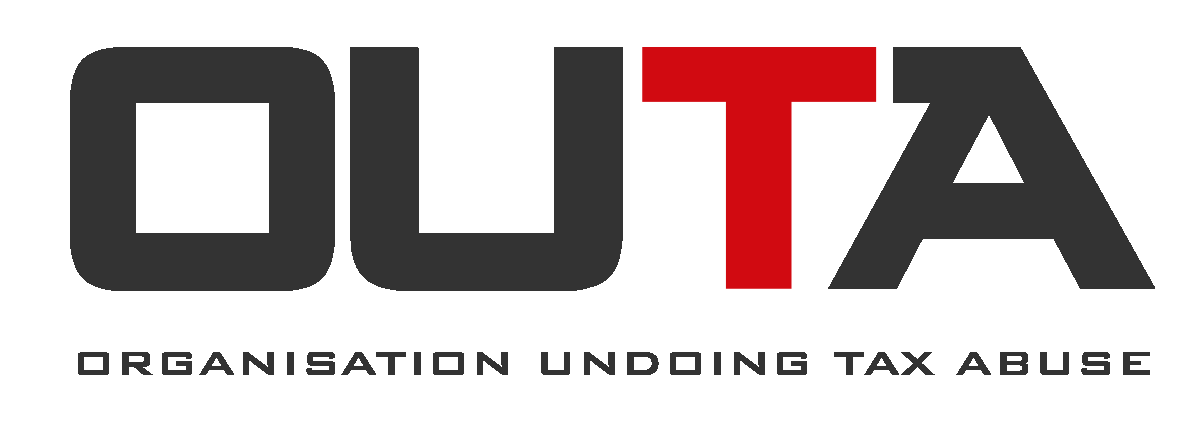Graphic: OUTA
OUTA uncovers multimillion rand tender corruption at NSFAS
The Organisation Undoing Tax Abuse (OUTA) announced today that it will launch a full-scale investigation into multimillion rand tender corruption at the National Student Financial Aid Scheme (NSFAS).
This follows OUTA’s investigation into corruption and irregular contracts at the Services Sector Education and Training Authority (SSETA) after a successful PAIA application relating to a R170 million tender for a biometric attendance monitoring system awarded to the Grayson Reed consortium.
OUTA’s scrutiny of the documents for the Grayson Reed contract uncovered further maladministration, corrupt activities, and non-performance by Grayson Reed. The Grayson Reed contract was prematurely cancelled by SSETA. It was also subsequently found that some of the same individuals who were involved in the cancelled Grayson Reed, registered new companies with relatives as the directors. One of these companies was awarded a tender by NSFAS for similar services that the Grayson Reed Consortium provided to SSETA.
President Cyril Ramaphosa recently issued a proclamation for the Special Investigating Unit (SIU) to investigate maladministration at NSFAS relating to the management of finances, allocation of loans, bursaries and any other funding to students, as well as any irregular and wasteful expenditure incurred by NSFAS, including the causes of such maladministration.
The OUTA investigations team met with the SIU’s NSFAS investigation team this week to hand over all information from investigations and findings on SSETA and NSFAS corruption. “The investigation report into the Grayson Reed/SSETA tender will provide the SIU with the necessary background regarding the involvement of certain individuals who are now doing business with NSFAS,” says Rudie Heyneke, project manager at OUTA. Heyneke says the SIU undertook to incorporate OUTA’s findings in the unit’s investigations.
According to Heyneke, if the possible irregularities OUTA uncovered at NSFAS is not investigated, it can cost the taxpayer up to one billion rand per annum if allowed to continue. “That is enough money to pay the tuition fees of 20 000 students per year.”
According to its website, NSFAS is meant to provide financial aid “efficiently and effectively” to students from poor and working class families in a “sustainable manner that promotes access to, and success in, higher and further education and training, in pursuit of South Africa’s national and human resource development goals”.
However, media reports as well as social media shows that this if often not the case, says Heyneke. “Too many NSFAS funded students don’t receive their allowances, while many students complain that their tuition fees were not paid over to the tertiary institutions where they study. We have also read about students who cannot attend classes or don’t have money to pay for transport, or buy food or basic necessities because they haven’t received their NSFAS allowances.”
Many of these students are therefore unable to complete their studies, despite millions of rands being set aside by government for exactly this purpose.
“This situation is intolerable and the result of suspicious service providers who do not perform in terms of their contracts but who are still paid millions of rand.”
Heyneke says OUTA will continue with its own investigations into certain tenders at NSFAS while sharing information with the SIU. “OUTA will not allow dubious tenders and the actions of unethical service providers and public officials to negatively impact students’ lives.”
OUTA will in due course submit a PAIA request to NSFAS to obtain information regarding several tenders that were awarded in 2022. “Since NSFAS states on their website that accessibility and transparency towards their students and stakeholders are two of their core values, we trust that NSFAS will live up to these values and not deny OUTA the requested information,” Heyneke says.
“If NSFAS share the information we request, it will prevent a re-occurrence of the cost incurred by SSETA after OUTA’s successful PAIA application on the Grayson Reed tender in 2018. This failed tender not only cost SSETA R170m, but they also had to pay OUTA’s legal costs. Sadly, all of this ultimately cost taxpayers more than R180 million.
Heyneke says OUTA’s investigation also revealed that NSFAS does not have a PAIA manual as legally prescribed. “But that should not hinder civil society their Constitutional right to access public information.”
OUTA calls on all stakeholders, students and public officials who have information on any wrongdoing, maladministration, and corrupt activities at NSFAS to contact them, or alternatively, to report it on the secure, anonymous whistleblower portal at www.outa.co.za
Background to Grayson Reed / SSETA investigation
In 2018 OUTA received information regarding possible corruption and irregular contracts at the Services Sector Education and Training Authority (SSETA). OUTA specifically requested the relevant tender documents of Bid PROC 434T relating to the roll-out and management of the biometric attendance monitoring system (BLAMS) and direct disbursement of periodic learner stipends with a PAIA application.
The PAIA request was denied by SSETA.
After an unsuccessful internal appeal there was no other option but to approach the High Court to compel SSETA to provide the documents and information to OUTA. After almost 3 years of litigation the court ordered SSETA to hand over the requested documentation to OUTA and to pay the legal costs of the application.
The delay caused by SSETA by not providing the information led to payments of approximately R170m to the Grayson Reed Consortium. SSETA cancelled the contract prematurely in September 2019 and stated that it became clear that the Grayson Reed Consortium did not deliver in terms of the agreement and that most learners were still paid based on manual attendance registers.
More information
For a summary of OUTA’s previous work on this matter, see here.
Comment from OUTA's Rudie Heyneke is here.
